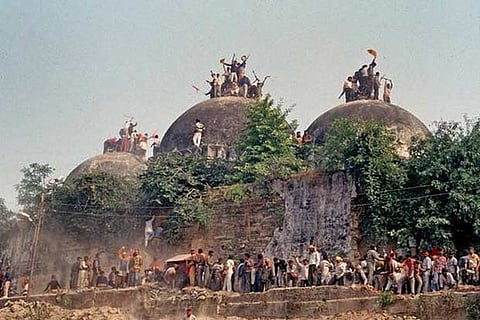

Chennai
The CBI Special Court verdict in the Babri Masjid demolition case, which has resulted in the acquittal of 32 leaders, many belonging to the BJP and the VHP, raises a simple question – is this the way justice is done?
The main facts relating to the crime are not in dispute. The demolition was carried out by a mob of vandals on December 6, 1992, in the presence of most of these leaders.
Together, they were responsible for carrying out a campaign for building a Ram temple on the location where the mosque, which was built during the Mughal conquest of the region, stood.
It is well known that the VHP’s campaign and former BJP president LK Advani’s rath yatra had stoked militant feelings and caused great divisions in their wake. Given all of this, how is justice served by a blanket acquittal?
In letting LK Advani, former Union Minister MM Joshi and others walk free, the court was led by a narrow definition for what constitutes a conspiracy. If conspiracy means establishing that the 32 accused huddled together with the common intent of tearing the mosque down, then there is indeed no clear evidence that one existed. There is in fact some evidence that those assembled at the platform near the mosque such as Advani and VHP leader Ashok Singhal, had tried to appeal to the rampaging mob, but the larger question is whether it is enough for such a case to be settled on the simple question of whether the accused had planned the demolition in advance. Reducing or framing the entire case relating to the demolition in this manner disregards the moral culpability of those who ran a hostile campaign to bring the issue to such a pass.
When the then Uttar Pradesh Chief Minister Kalyan Singh provided assurances that the mosque would be protected, was his information merely flawed, or was he grossly negligent in failing to determine the intent of his violent ideological associates? Who created the climate that encouraged the hooligans who eventually brought down the mosque? Can those who actively fanned the flames and looked elsewhere when slogans such as ‘Ek dhakka aur do, Babri Masjid tod do’ (One more push, break Babri Masjid) stand totally exculpated? Whether the CBI will challenge the verdict remains to be seen.
But it is an indictment of the judicial system that the case should have taken 27 years to reach a verdict. It also took a series of mystifying twists and turns and it wasn’t until a few years ago that the Supreme Court restored the criminal conspiracy charges against Advani and others and demanded a time-bound completion of the trial in the case. The big question, of course, is why couldn’t this have been done earlier. It is the sheer passage of time as opposed to the gravity of the offence that engenders a moral weariness and the feeling that a significant case like this has – as the Shiv Sena smugly claimed – lost its relevance.
Visit news.dtnext.in to explore our interactive epaper!
Download the DT Next app for more exciting features!
Click here for iOS
Click here for Android